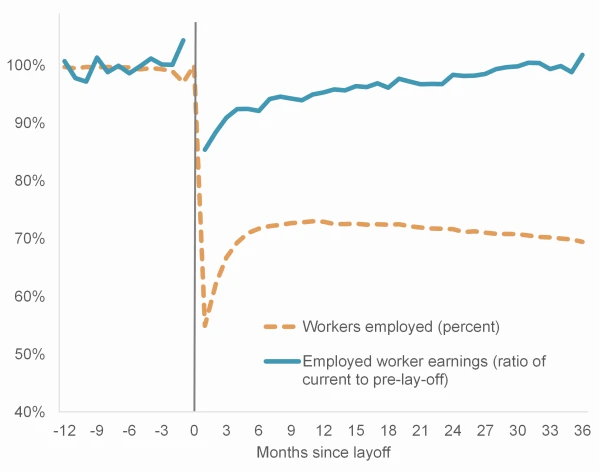Neoliberal stalking horse scratched from the races. Will another champion for unpopular research arise?

At its research core, the New Zealand Productivity Commission focused on skills and technology and drivers of productivity growth. Our inquiries explored the policy levers and systems needed to diffuse these benefits across different parts of the economy, and how to turn these efficiencies into long-term prosperity for all communities in New Zealand.
Now it is the first on the government chopping block in public service redundancies. This op-ed looks at what is being gained and what is being lost at the same time.
Government funding cuts and the potential for public service redundancies are in the news. The first head on the chopping block, announced the day the coalition agreement was finalised was none other than our own, the New Zealand Productivity Commission. As an organisation that spent more than a decade espousing productive resource allocation, we are now having to take a spoonful of our own resource reallocation medicine. Flexible labour markets for everyone! Good for productivity and good for workers.
Really, the Commission has had at its research core a focus on skills and technology and drivers of productivity growth. Its inquiries have explored the policy levers and systems needed to diffuse these benefits across different parts of the economy, and how to turn these efficiencies into long-term prosperity for all communities in New Zealand – not just the people holding the capital. The answer? Inclusion.
At one level any opportunity for labour to move towards something more useful is economically a good thing. It is also important to ask whether anything will be lost along the way? In all likelihood, yes (especially for those that are being laid off), but at a higher level they key is to understand what is being gained and what is being lost at the same time. While redundancies might be a boon for growing businesses facing their own skill shortages, too much labour market churn can discourage participation and limit people’s willingness to invest in education or put down roots. Labour market policy needs to strike a balance between flexibility for firms and maintaining some protections for workers, especially as our research points out for those on low-incomes, the unskilled, and mid- and late career workers in non-urban parts of NZ.
Research for the Productivity Commission’s Inquiry Economic Resilience to Supply Chain Disruptions looked at how different types of workers who became involuntarily laid off from their jobs move to new jobs across industry, location, and firm type. Economists at the Commission and at Motu Research used anonymised data from Stats NZ’s Integrated Data Infrastructure to look at the likelihood of re-employment following displacement – including actual pathways, timeframes and quality of the next job – and how much these aspects are affected by the existing structure of the regional labour market. It was tough reading.
While 50% of displaced workers found new jobs immediately after a lay-off, it took almost six months for re-employment to reach two-thirds. The remaining third of people left the market by retiring, leaving New Zealand, becoming long-term unemployed or stopping looking for work.
Post-layoff earnings were substantially below pre-layoff earnings, suggesting that the first job post-layoff was an inferior option for the worker. On average, earnings can take almost three years to recover to pre-layoff levels, even for those who avoid long-term unemployment. 
Of significant concern is the large proportion of workers who emigrate or decide to leave the job market. Aside from the personal disruption, upheaval and the sadness related to being made involuntary laid-off, if people opt out of the labour market, it also represents a major loss of skill and productive capacity that New Zealand firms need.
In our Technological change and the future of work inquiry, we recognised the need to support people through job transitions arising from disruptions. We recommended greater income smoothing for displaced workers, improved employment services for workers who are displaced or at risk of displacement, and measures to assist reskilling them (NZPC, 2020).
The Commission has also recommended improvements to education and training policies in previous inquiries. In the Immigration – Fit for the future inquiry (NZPC, 2022), we emphasised the need to link skills shortages to education and training policies. In our Technological change and the future of work inquiry (NZPC, 2020), we recommended that the government monitor indicators of technology adoption and labour-market change, in New Zealand and internationally, to help anticipate and prepare for such changes. We recommended greater flexibility in the qualifications system and in tertiary education, to make it easier for adults to retrain and continuously upgrade their mix of skills.
Unfortunately, over the years the Commission has not been listened to, as many speaking in Parliament on the Productivity Commission Act Disestablishment Bill noted. While James Shaw noted that the most influential inquiry has been Low Emissions, the government continues to ignore both the Commissioner, the PCE, and various experts to adopt a ‘two baskets approach’ and treat biological emissions separately from others.
But it is in the wellbeing areas of productivity policy – labour markets, immigration, tertiary education, and social policy – where the Commission has proved most divisive and irritating to governments. While early on, the Commission was seen as a neoliberal stalking horse, more recently, the other side of politics has held the opposite concern about us caring too much about people’s feelings and not enough about productive wealth creators. Managing this nuance and complexity, bridging the ideological divide and identifying the common ground in different prescriptions for an ideal society, is now for someone else to pick up. Good luck.
